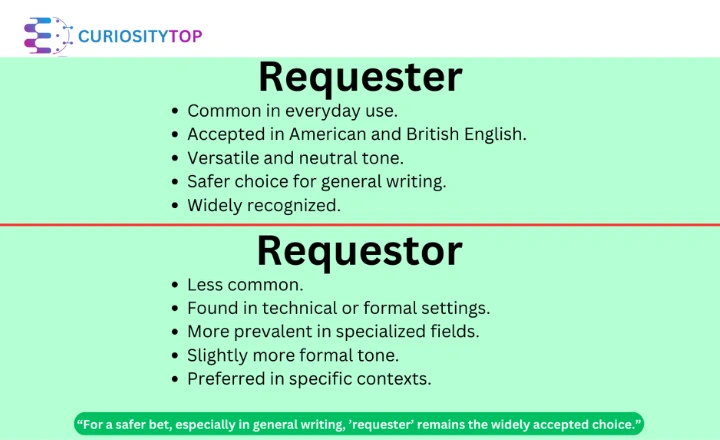Requester or Requestor: Which Spelling to Use?
The spelling choice between Requester or Requestor can create uncertainty when writing professional documents or emails. Both terms appear valid at first glance, making it challenging for writers to choose the most appropriate option. The English language often presents such subtle variations, and understanding the differences can help enhance your writing accuracy.
What do “Requester” and “Requestor” Mean?
At their core, both requestor and requester refer to an individual or entity that makes a request. These terms function similarly to other agent nouns in English, like “advisor/adviser” or “investor.” In everyday usage, you’ll encounter both spellings across various contexts, from casual correspondence to formal documentation.
The term evolved from the base word “request,” with the addition of suffixes “-er” or “-or” creating the agent noun. These suffixes historically served the same purpose – identifying the person acting. Both versions maintain their legitimacy in modern English, though usage patterns reveal interesting preferences.
Modern dictionaries recognize both spellings, acknowledging their interchangeability in most situations. Specific industries and regions may show distinct preferences for one form. Understanding these patterns helps writers make informed choices based on their needs and audience expectations.
“Requester” vs “Requestor”

The debate between requester vs requestor continues in professional circles, though clear patterns emerge when examining common usage. The spelling “requester” dominates general writing, particularly in American and British English publications. Style guides often recommend this version for its simplicity and widespread acceptance.
“Requester” aligns with the traditional English pattern of adding “-er” to verbs to create agent nouns. This formation follows the same pattern as a teacher, writer, or builder. Its prevalence in casual and formal writing makes it a safe choice for most situations.
| Aspect | Requester | Requestor |
|---|---|---|
| Definition | Someone who makes a request | Someone who makes a request |
| Common Usage | More common in general usage | Less common overall |
| Language Preference | Preferred in both American and British English | Less frequent; used in specific contexts |
| Contexts | Everyday communication, legal documents, business settings | Technical fields (e.g., computer programming), specialized legal contexts |
| Perceived Formality | Neutral, suitable for most situations | Slightly more formal or specialized |
| Versatility | Versatile; can be used in any context | Context-specific; may be chosen for stylistic reasons |
| Safe Bet | Yes, it is always a reliable choice | Context-dependent; not as universally recognized |
The alternative spelling, requestor, appears more frequently in specialized contexts. Some legal documents and technical specifications prefer this variation due to its perceived formality. The “-or” suffix sometimes carries a slightly more official or technical tone, similar to words like “executor” or “contractor.”
You can also read about Pre vs Post: Which Prefix to Use?
Choosing the Right Term
When selecting between these spellings, consider your audience and writing context. For general business communication, academic writing, or everyday correspondence, “requester” is the most widely accepted option. Its familiarity and broader usage make it less likely to distract readers or raise questions.
Technical writers and legal professionals might encounter situations where requesters or requestors appear in established documentation. In such cases, maintaining consistency with existing materials takes precedence. Some organizations maintain style guides specifying their preferred spelling, which should guide your choice in professional settings.
Here’s a helpful comparison table:
Origins of the Word “Requester and Requestor”
The history of requester or requestor traces back to ancient roots. Latin speakers used “requaerere” as their base word to ask or seek something. This word changed over time, moving through Old French as “requeste” before reaching Middle English.
The English language took this word and added two different endings. The “-er” suffix created “requester,” making it the more common choice in everyday writing. The “-or” ending produced “requestor,” which gained popularity in formal settings.
These different endings came from separate language traditions. The “-er” ending shows English influence, while “-or” keeps its Latin roots. Both forms name someone who asks for something but developed different uses over time.
Do you want to know about Since vs Sense: Understanding When to Use Each Word
Examples in Context
Understanding how to use requesters or requestors correctly requires looking at real-world examples. Let’s examine both forms in different situations.
Requester Examples:
Business emails often use this form: “The requester needs to fill out form A-1 before submitting any claims.”
In school settings: “Each requester must show a student ID to check out library materials.”
Customer service often uses this version: “Our team responds to each requester within 24 hours.”
Government forms typically say: “The requester should provide two forms of identification.”
Requestor Examples:
Legal documents often use this form: “The requestor must submit all required paperwork by the deadline.”
Technical manuals prefer this version: “The requestor’s system must meet these requirements.”
Banking documents state: “The requestor’s signature must match our records.”
Corporate policies write: “Each requestor needs approval from their department head.”
Synonyms of the Word “Requester”
Writers can use many other words instead of requester vs requestor. Here are common alternatives:
- Applicant fits well in job-related contexts.
- Petitioner works best in legal situations
- Seeker matches informal writing needs
- Inquirer suits journalistic writing
- Claimant works for insurance matters
- Candidate fits the hiring situations
- Proposer matches business settings
- Solicitor works in British legal contexts
- Pleader fits court document needs
- Claimer suits general writing needs
Each synonym carries its tone and fits different writing situations. Choose based on your specific needs and writing style.
Conclusion
The choice between requester or requestor ultimately depends on your specific writing context and audience. While both spellings correctly identify someone making a request, “requester” is the more common and widely accepted version. Consider your professional environment, document type, and reader expectations when selecting. Remember that consistency within your chosen spelling remains more critical than the specific version you pick.
FAQs
Which is correct – requestor or requester?
Both spellings are correct in English. “Requester” is commonly used and follows standard English formation, while “requestor” appears more formal in business contexts.
What does requestor mean?
A requestor is someone who makes a formal request or application for something. The term is often used in business and legal contexts when referring to individuals seeking services.
Is there such a word as requester?
Yes, “requester” is a valid English word referring to a person who makes a request. It’s widely used in everyday language and official documentation.







